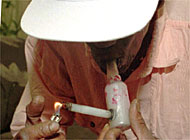
Doctors consider cocaine prescription

Switzerland's policy of harm reduction for drug users could go one step further with a programme of cocaine prescription.
Positive results from Switzerland’s heroin prescription programme, which show patients achieving better health and a more stable life style, have led some doctors to believe that cocaine addicts could be helped in the same way.
Dr Daniel Meili, who is chief medical officer for Zurich’s heroin prescription programme, is pleased with the way patients on the programme have improved, but wants more flexibility in what he can offer them.
“We need more options,” he said. “We are still too restricted in what we can do and we are not reaching all the people who need our help.”
Meili points out that most heroin addicts continue to use cocaine as well, which they must buy on the illegal drugs scene.
“Most addicts like the combination,” he explained, “and can’t or don’t want to give up cocaine. And since we don’t have many options for treating cocaine addiction it is difficult to reach these addicts.”
Smokers’ rooms
In an attempt to reach those who use both heroin and cocaine, Zurich opened two smokers’ rooms at the start of this year. They share premises with the injection rooms, and allow addicts to smoke cocaine or heroin in peace.
Robert Reithauer, the social worker in charge of the Selnau drug users centre, admits he was sceptical at first about having a smokers’ room, but says it is working very well.
“The reputation of crack cocaine smokers is very bad,” Reithauer explained. “They are prone to aggression. But here they can consume the drugs they have bought illegally – cocaine or heroin – under hygienic conditions.”
“We have maybe 20 or 30 people a day coming to use the smokers’ room; some people come two or three times a day, and really we are surprised at how well it is going.”
Good ventilation
The room itself has enough space for three people, and a powerful air conditioning system to ensure that staff at the centre do not inhale the fumes.
There is even a large roll of aluminium foil on the wall, which addicts need to cook up their fix.
One user, who wanted to remain anonymous, said he was pleased with the new room.
“It’s a positive thing,” he told swissinfo. “If this room wasn’t here we’d be on the streets, or hiding in the public toilets trying to smoke, and we’d be picked up by the police.”
It’s a shocking sight to those more familiar with drug addiction programmes which encourage patients to give up their habit.
But for many medical staff and social workers, the smokers’ rooms are simply a logical extension of the harm reduction policies which began with the needle exchanges and injection rooms.
Ruth Vogt, who is head of drugs policy at Zurich’s social work department, says maintaining contact with as many addicts as possible is crucial.
“There’s no point closing our eyes and hoping they’ll just stop taking drugs,” she told swissinfo. “They won’t stop. And many of these addicts are ill; they are infected with Hepatitis C for example, so it’s much better if we can have the contact with them and provide them with medical and social help.”
Cocaine on prescription
For Ruth Vogt and Daniel Meili, the next step should be to introduce a cocaine prescription programme.
“I think we should try it,” said Vogt. “Obviously we need to start with a medical trial – a lot of research needs to be done – but I think we should try.”
Meili himself is increasingly impatient with what he sees as a lack of options for treating people addicted to both cocaine and heroin.
“It’s only half a treatment if I can only prescribe them with heroin,” Meili said. “It means they stay in the illegal drugs scene. They spend a lot of money, they stay in contact with all those people in the scene, and so it is very difficult to change their life and their social situation.”
Meili says he would start prescribing cocaine tomorrow if he was permitted to do so, but agrees that more research is needed.
“The point is that we won’t know if it will work unless we try,” he explained. “And I don’t want to argue about cocaine prescription on an emotional or idealogical level. I want to discuss it on a medical and scientific basis, and for that we need proper research.”
Scepticism
But at the Federal Health Department in Bern officials are sceptical about cocaine prescription. Ueli Locher, head of drugs policy at the department, says he doubts that many doctors would support such a programme.
“The prescription of cocaine has a lot of problems,” Locher told swissinfo. “It’s a much more difficult drug to control than heroin, and there are risks associated with it. Users can become psychotic, or aggressive, and there is a risk of heart attack.
“Many doctors have told us that they don’t want to take the responsibility of prescribing it.”
Nevertheless Locher admits that there is a problem over how to treat cocaine addicts.
“Medical professionals have told us they feel helpless, not just in Switzerland but all over the world it’s the same. No one really knows what to do about this.”
Later this year the Federal Health Department will be holding consultation meetings with doctors and social workers to discuss new ways of treating cocaine addiction.
“I really don’t see cocaine prescription as a viable option at the moment,” said Locher. “But still we should be ready to listen, and be open to new proposals.”
by Imogen Foulkes

In compliance with the JTI standards
More: SWI swissinfo.ch certified by the Journalism Trust Initiative




























You can find an overview of ongoing debates with our journalists here . Please join us!
If you want to start a conversation about a topic raised in this article or want to report factual errors, email us at english@swissinfo.ch.